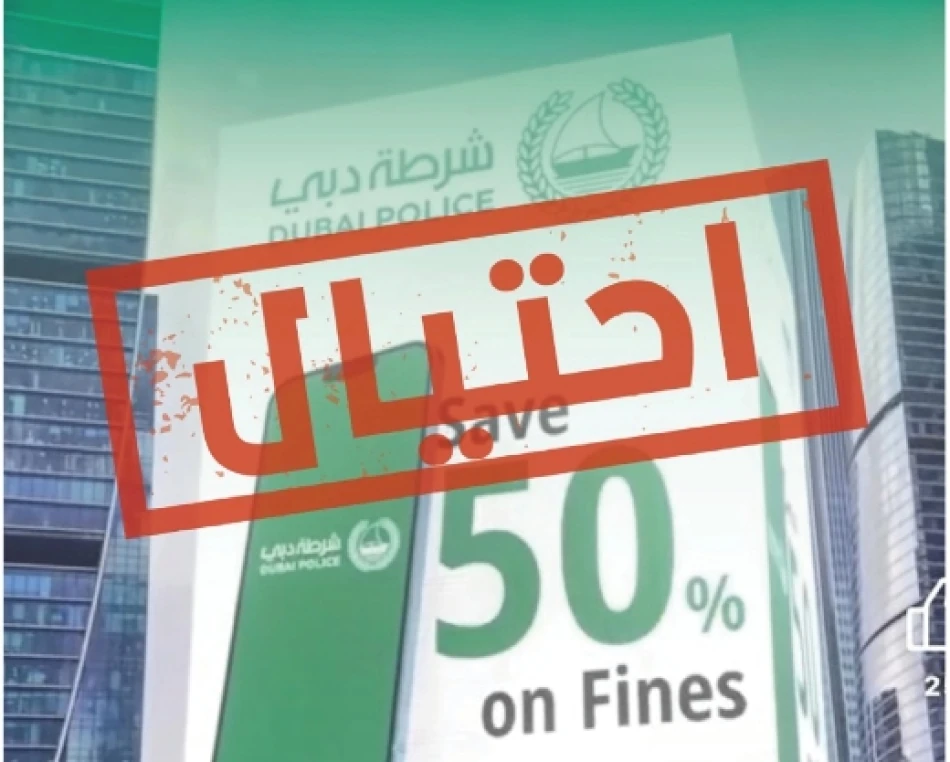
Dubai Police Bust Scammers Offering Fake Traffic Fine Discounts
Dubai Police Bust Traffic Fine Discount Scam Using Stolen Credit Cards
Dubai Police have arrested a criminal network that exploited social media to offer fake traffic fine discounts of up to 70%, using stolen credit card data to pay victims' fines while pocketing cash payments. The sophisticated fraud highlights growing concerns about financial crimes targeting UAE residents through deceptive online offers.
The Criminal Operation Explained
The Anti-Fraud Center of Dubai Police's General Department of Criminal Investigation uncovered a scheme where fraudsters advertised discounts ranging from 30% to 70% on traffic violations through social media platforms. The criminals would approach potential victims offering to pay their full fine amount using stolen banking credentials, then collect half the fine's value in cash from the "beneficiary."
According to Dubai Police, the perpetrators obtained stolen credit card information through electronic fraud methods or by purchasing compromised data from suspicious sources. They would then use these stolen credentials to settle traffic fines for individuals lured by their misleading advertisements, meeting victims in person to collect cash payments before processing the full fine payment.
A Double-Edged Criminal Enterprise
The operation represents what Dubai Police describe as a "double crime" combining banking data theft with financial fraud. Authorities emphasized that victims who knowingly participated in these illegal discount schemes could potentially face charges as accomplices, adding a legal risk dimension that many participants likely never considered.
Broader Implications for Digital Security
This case reflects a growing trend across the Gulf region where criminals exploit legitimate government services through fraudulent intermediaries. Similar schemes have emerged in other UAE emirates and neighboring countries, where scammers capitalize on residents' desire to reduce official penalties through unofficial channels.
The Dubai operation mirrors fraud patterns seen globally, where criminals monetize stolen financial data by offering "services" that appear beneficial to victims while generating cash flow from compromised banking information. This approach allows fraudsters to convert stolen digital assets into untraceable cash payments.
Market and Regulatory Response
For financial institutions operating in the UAE, this case underscores the importance of enhanced fraud detection systems and customer education programs. Banks may need to strengthen monitoring of unusual payment patterns, particularly those involving government fee payments that deviate from typical customer behavior.
The incident also highlights the UAE's commitment to maintaining its reputation as a secure financial hub, with law enforcement agencies actively pursuing sophisticated fraud schemes that could undermine public trust in digital payment systems.
Official Warnings and Prevention Measures
Dubai Police stressed that legitimate traffic fine payment channels are clearly defined and managed exclusively by authorized police departments. Any offers to reduce fines through unofficial means constitute violations punishable by law, regardless of the discount percentage promised.
Authorities urged community members to report similar attempts immediately through the "Police Eye" service or the 901 call center, emphasizing their continued commitment to combating all forms of crime while strengthening digital and economic security throughout the emirate.
The successful bust demonstrates Dubai's proactive approach to emerging fraud schemes, particularly those exploiting social media platforms to reach potential victims. As digital payment adoption continues expanding across the region, such enforcement actions serve as crucial deterrents against similar criminal enterprises.
Most Viewed News

 Layla Al Mansoori
Layla Al Mansoori






